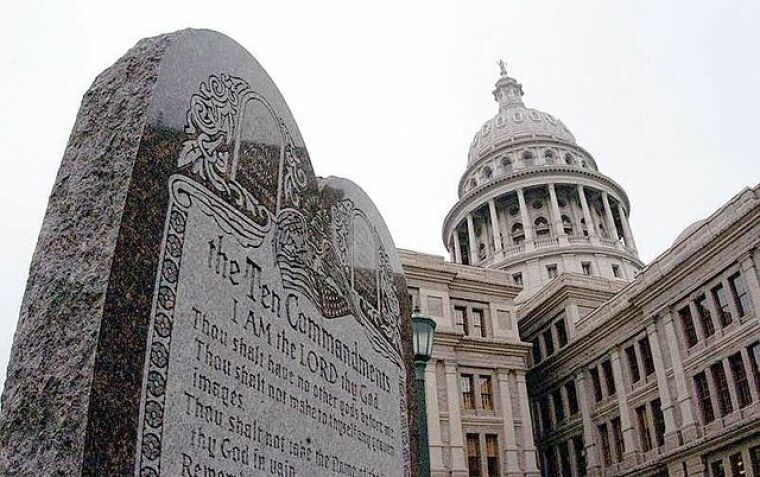US Supreme Court turns down appeal over removal of Ten Commandments monument in New Mexico

The U.S. Supreme Court has turned down an appeal over the removal of a Ten Commandments display on the lawn outside the city hall in Bloomfield, New Mexico.
According to Christian News Network, two Wiccan women filed a lawsuit in 2012 against the placement of the five-foot-tall monument because it made them feel "alienated." Lower courts ordered the removal of the display, arguing that it amounted to a government endorsement of religion.
The city argued that the monument was historical in nature, but the American Civil Liberties Union (ACLU), which represented the two Wiccans, contended that the contents of the Ten Commandments themselves is blatantly religious.
"One of the commandments is thou shalt put no gods before me. This is clearly not a historical document, but is in fact religious doctrine," said Alexandra Smith, legal director for the ACLU of New Mexico.
City officials also noted that the monument was paid for by private donations and had an engraved disclaimer saying, "Any message hereon is of the donors and not the city of Bloomfield." However, the lower courts found that several city officials had advocated for the placement of the display and were involved in raising money for it.
The city appealed the decision, arguing that courts across the U.S. have issued conflicting rulings on when Ten Commandments monuments are allowed on public property.
The U.S. Supreme Court did not indicate its reason for declining to hear the case on Monday. The court had previously contended that religious displays on public property run the risk of violating the Constitution if they have the effect of endorsing religion.
The test, however, has led to contradictory results, with the high court issuing two seemingly conflicting rulings on the same day in 2005. The court ordered the removal of framed displays of the Ten Commandments in Kentucky courthouses, but it allowed a Ten Commandments monument on the lawn outside the Texas state capitol building.
In ordering the removal of the Decalogue in New Mexico, the Tenth Circuit Court of Appeals said that it depends on the circumstances that led to its placement.
The appeals court noted that there are times when such displays run afoul of the Constitution, "and other times when the display passes constitutional muster."
The religious liberties organization Alliance Defending Freedom (ADF), which was helping to represent the city of Bloomfield, expressed disappointment that the case has no further chance of an appeal.
"In this case, the U.S. Supreme Court had the opportunity to affirm, as it recently did, that 'an Establishment Clause violation is not made out any time a person experiences a sense of affront from the expression of contrary religious views.' We hope the court will take advantage of a future case to resolve the confusion that reigns in the lower courts on this issue," said ADF Senior Counsel David Cortman.
 Christians don't have to affirm transgenderism, but they can’t express that view at work: tribunal
Christians don't have to affirm transgenderism, but they can’t express that view at work: tribunal Archaeology discovery: Medieval Christian prayer beads found on Holy Island
Archaeology discovery: Medieval Christian prayer beads found on Holy Island Presbyterian Church in America votes to leave National Association of Evangelicals
Presbyterian Church in America votes to leave National Association of Evangelicals Over 50 killed in 'vile and satanic' attack at Nigerian church on Pentecost Sunday
Over 50 killed in 'vile and satanic' attack at Nigerian church on Pentecost Sunday Ukrainian Orthodox Church severs ties with Moscow over Patriarch Kirill's support for Putin's war
Ukrainian Orthodox Church severs ties with Moscow over Patriarch Kirill's support for Putin's war Islamic State kills 20 Nigerian Christians as revenge for US airstrike
Islamic State kills 20 Nigerian Christians as revenge for US airstrike Man who served 33 years in prison for murder leads inmates to Christ
Man who served 33 years in prison for murder leads inmates to Christ


 Nigerian student beaten to death, body burned over ‘blasphemous’ WhatsApp message
Nigerian student beaten to death, body burned over ‘blasphemous’ WhatsApp message 'A new low': World reacts after Hong Kong arrests 90-year-old Cardinal Joseph Zen
'A new low': World reacts after Hong Kong arrests 90-year-old Cardinal Joseph Zen Iran sentences Christian man to 10 years in prison for hosting house church worship gathering
Iran sentences Christian man to 10 years in prison for hosting house church worship gathering French Guyana: Pastor shot dead, church set on fire after meeting delegation of Evangelicals
French Guyana: Pastor shot dead, church set on fire after meeting delegation of Evangelicals ‘Talking Jesus’ report finds only 6% of UK adults identify as practicing Christians
‘Talking Jesus’ report finds only 6% of UK adults identify as practicing Christians Mission Eurasia ministry center blown up in Ukraine, hundreds of Bibles destroyed: 'God will provide'
Mission Eurasia ministry center blown up in Ukraine, hundreds of Bibles destroyed: 'God will provide' Church holds service for first time after ISIS desecrated it 8 years ago
Church holds service for first time after ISIS desecrated it 8 years ago Burger King apologizes for 'offensive campaign' using Jesus' words at the Last Supper
Burger King apologizes for 'offensive campaign' using Jesus' words at the Last Supper Uganda: Muslims abduct teacher, burn him inside mosque for praying in Christ’s name
Uganda: Muslims abduct teacher, burn him inside mosque for praying in Christ’s name